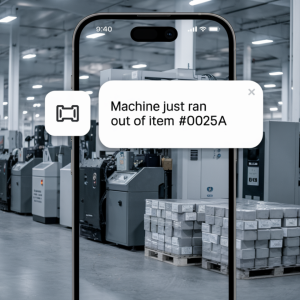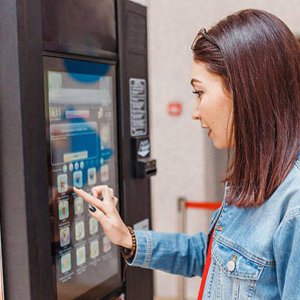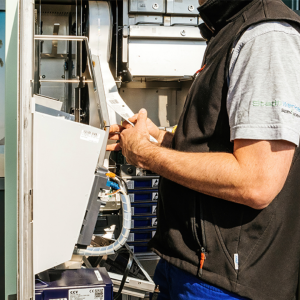How Alcohol Vending Machines Work: Laws, Licensing, and Profitability
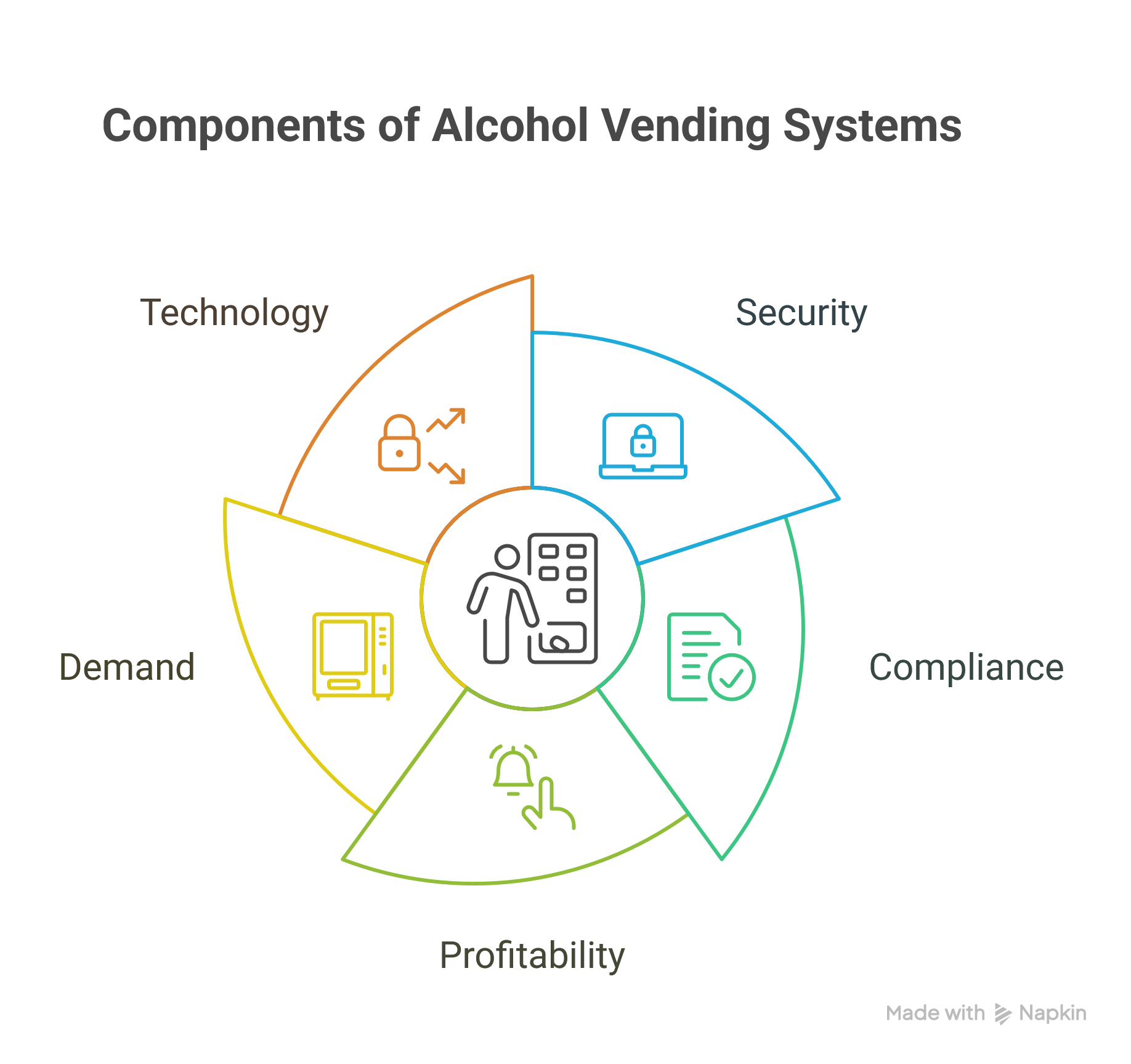
Alcohol vending is not just about placing drinks in a machine. It is about creating a secure, compliant, and profitable system that operates where demand is highest. These machines combine advanced technology with strict legal safeguards, making them a viable option for operators ready to step into the alcohol retail market.
Product Selection and Display

Modern alcohol vending machines are designed to present beverages in a way that is intuitive and attractive. A touchscreen display guides customers through the available options, from beer and wine to canned cocktails. Machines like the Alcohol Drinks Vending Machine and the ChillDrop Vending Machine can be stocked with single-serve cans, bottles, or ready-to-drink cocktails. The touchscreen is also an advertising tool, allowing brands to promote products or events at the exact point of purchase.
Compliance and Age Verification
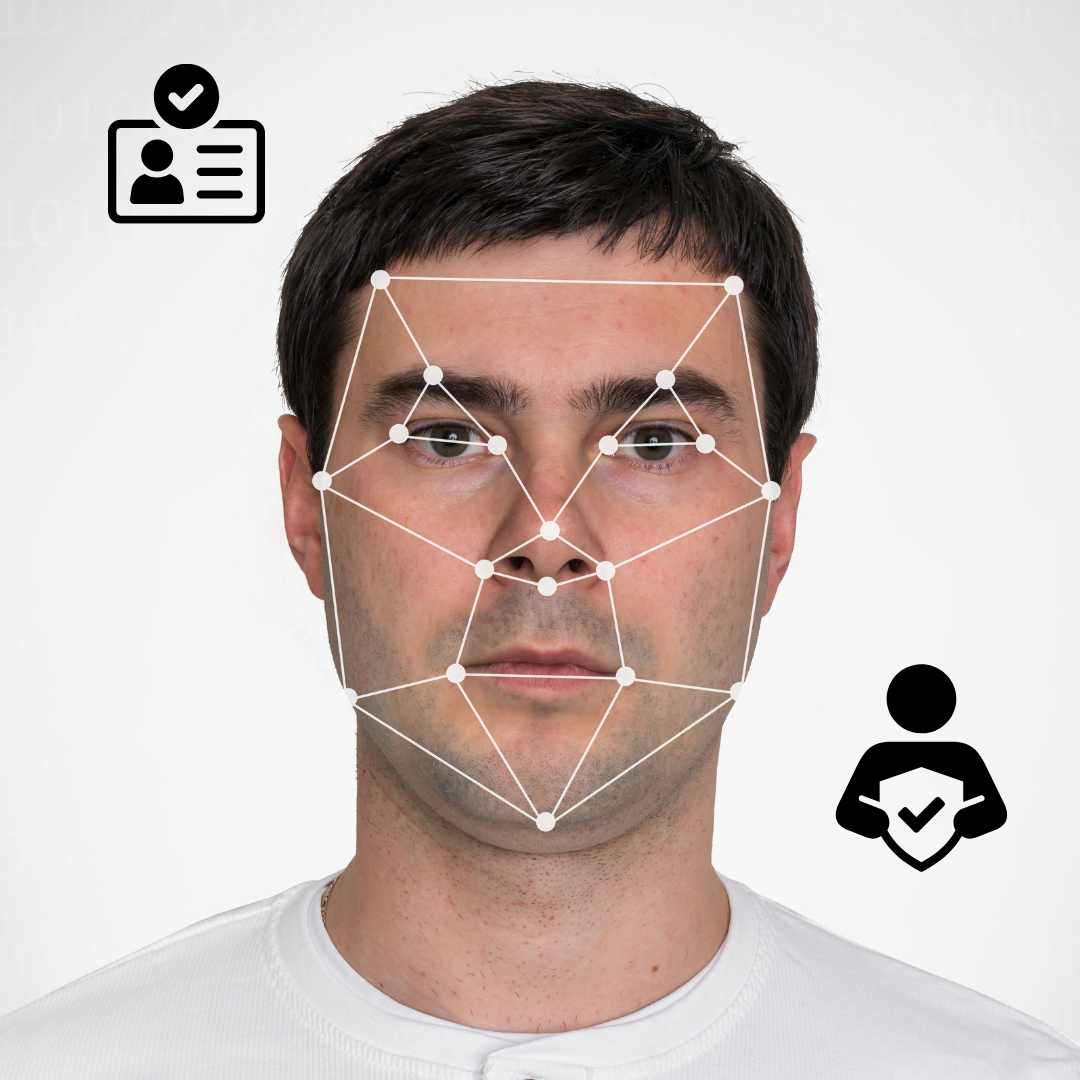
The most important feature is compliance. Every transaction must verify that the buyer is 21 or older. This is where technology becomes power. Built-in ID scanning and optional facial recognition prevent underage sales and keep operators in line with Tobacco 21 laws. Some states, such as Pennsylvania, add even stricter requirements like video monitoring, while Florida has already approved automated alcohol vending when strong ID checks are in place.
This is more than a machine; it is a compliance system. Operators gain authority and protection because the machine enforces the law automatically, without relying on human error.
Payment Systems and MDB Compatibility
Once a customer passes verification, payment is fast and secure. These machines are MDB compliant, meaning they integrate with the most trusted vending payment systems. Customers can use credit cards or mobile wallets for a seamless experience. Cash handling is avoided, reducing risk and speeding up transactions.
Dispensing Technology: Elevator Systems
Unlike basic vending machines, alcohol machines are engineered for delicate handling. Bottles of wine or glass containers cannot simply drop into a bin. This is why many units use elevator systems, lowering products gently into the collection area. For cans, drop-safe or chute systems are used, while specialized models like the ChillDrop Vending Machine keep beverages chilled before release. This design ensures product quality and customer satisfaction.
Tracking, Security, and Operations
Every sale is tracked through cloud-based software. Operators can log in remotely to view revenue, monitor inventory, and receive alerts when stock runs low. Security is reinforced with heavy lock systems and tamper-resistant designs, protecting products in busy nightlife or festival venues.
By combining compliance, efficiency, and technology, these machines deliver more than alcohol. They deliver confidence, reliability, and revenue in places where traditional sales cannot.
Licensing in the United States
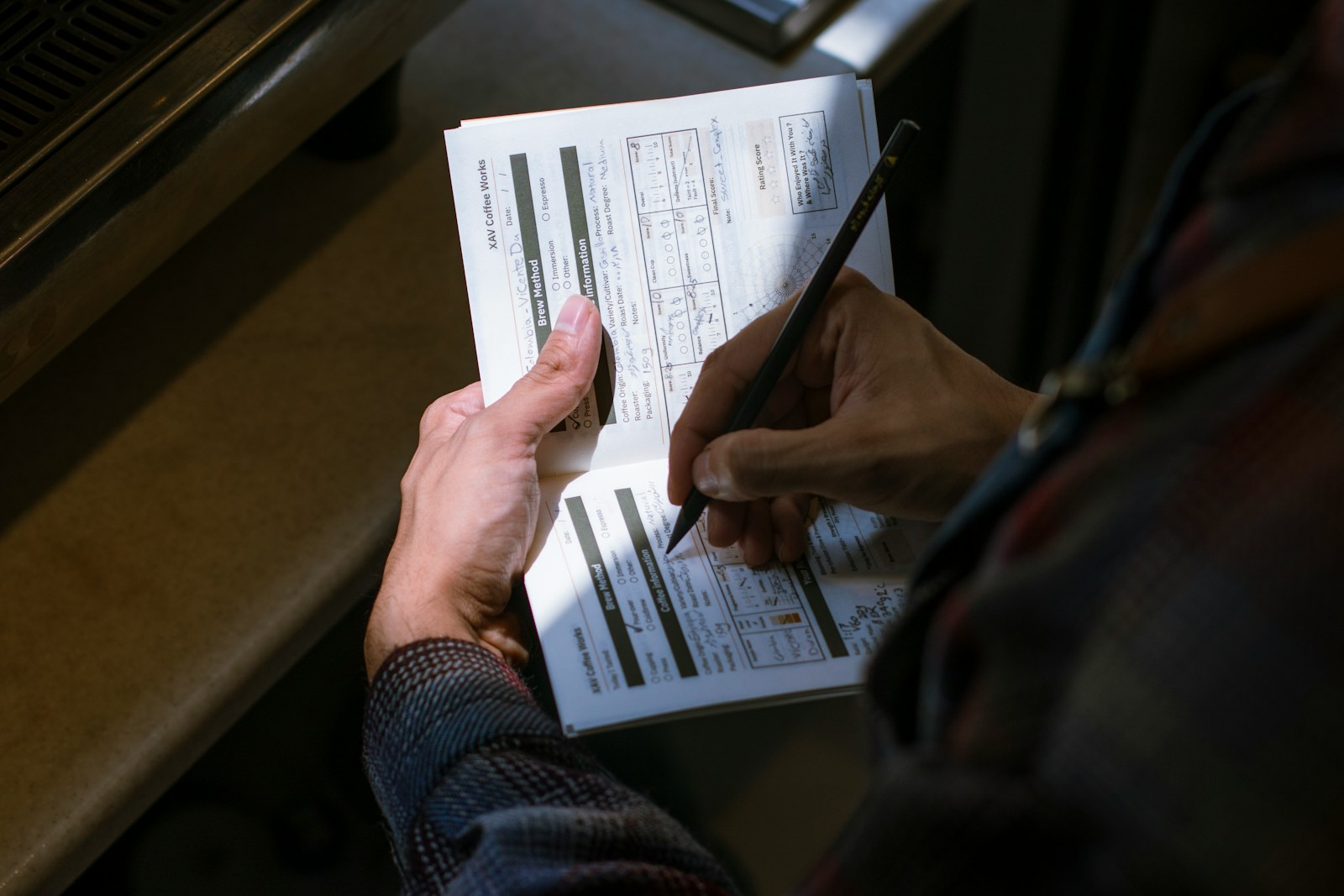
Alcohol vending machines must operate under strict state laws. Every state has an Alcoholic Beverage Control (ABC) authority that manages permits, licensing, and enforcement. Because regulations differ from state to state, operators should first understand the categories that define where and how machines can operate.
Federal Guidelines
At the federal level, vending machines must comply with the Tobacco 21 law, which prohibits alcohol and tobacco sales to anyone under 21. Machines also need to follow FDA and state labeling rules for packaged beverages. These federal rules set the baseline, but states decide the specific licensing process.
State Categories
Across the country, laws fall into three broad groups. Some states allow alcohol vending with licensing, others permit it only under restrictive conditions, and a few states do not allow it at all. Understanding this landscape helps operators plan where to place machines and how to stay compliant.
| Category | Example States | Key Notes |
|---|---|---|
| Allowed with Licensing | Florida, Texas, Nevada | Courts and regulators allow machines with ID verification and proper alcohol permits. Florida, for example, approved automated wine vending when operators installed strong age checks. |
| Restricted or Conditional | Pennsylvania, New York, California | Machines can operate only under strict oversight. Pennsylvania requires ID scanning plus monitoring. California allows vending tied to on-premise alcohol licenses. |
| Not Permitted | Utah, Alabama, South Carolina | These states currently prohibit alcohol vending machines altogether, regardless of technology. |
How to Navigate Licensing
Operators should always begin by contacting their state ABC authority. Most states require businesses to register, apply for the correct class of license, and pay permit fees. In many cases, you must also complete training or attend seminars. For example, Arkansas requires applicants to take an ABC seminar before approval, while California separates licenses into “on-sale” and “off-sale” categories. By understanding these requirements early, operators save time and avoid costly mistakes.
Practical Advice for Operators
Licensing should never feel like a barrier. Instead, it creates protection for both the operator and the venue. When you install an Alcohol Vending Machine through VMFS USA, you receive guidance on compliance and machine setup. With built-in ID verification and MDB-compatible payments, the machines already support many of the safeguards state boards require.
By approaching licensing with the right knowledge, operators move faster from application to operation. At the same time, they create an advantage by placing machines in venues where competitors hesitate due to legal confusion.
How to Acquire a License
Once you understand how states regulate alcohol vending, the next step is securing a license. Although every state has its own rules, the process often follows the same pattern. By preparing in advance, operators save time and improve their chances of approval.
Step 1: Register Your Business
Most states require businesses to register before applying for an alcohol license. This step often includes setting up a legal entity, registering for sales tax, and submitting your vending locations. Without registration, states will not process your alcohol license application.
Step 2: Contact the State ABC Authority
Each state manages alcohol through an Alcoholic Beverage Control (ABC) board or commission. Contact this agency directly to confirm which license applies to vending. In California, for example, the Department of Alcoholic Beverage Control offers different permits for on-premise versus off-premise sales. In Texas, the Alcoholic Beverage Commission issues beverage permits with restrictions based on venue type.
Step 3: Complete Required Training
Several states require applicants to attend seminars or complete training before approval. Arkansas, for instance, requires an ABC seminar for new license holders. Training ensures that operators understand how to prevent underage sales, how to handle compliance checks, and how to maintain accurate records.
Step 4: Submit the License Application
After you prepare your documents, you can submit the official license application. States usually request information about your business entity, vending machine models, and the venues where machines will operate. Applications also require background checks and fingerprinting for owners or managers.
Step 5: Pay Licensing and Permit Fees
Every state charges licensing fees, which vary by category. For small vending operations, fees are usually lower than those for full bars or retail stores. However, operators should budget carefully, since renewal fees often apply annually. Missing a renewal deadline can cause delays and even suspension of sales.
Step 6: Secure Local Approvals
Even after state approval, some cities and counties require additional permits. For example, local zoning boards may limit where alcohol vending machines can operate. Operators should confirm both state and local requirements before placing machines.
Step 7: Install Compliance-Ready Machines
Licensing approval alone is not enough. You also need machines that meet compliance standards. VMFS USA provides Alcohol Vending Machines with built-in ID verification, elevator dispensing for delicate bottles, and MDB-compatible payment systems. By using these machines, you satisfy many requirements set by regulators and reduce liability.
By following these steps, operators move efficiently from application to approval. More importantly, they establish a foundation for long-term, compliant alcohol vending operations.
Sourcing Alcohol Products
After licensing, sourcing becomes the next strategic step. A smart sourcing strategy supports compliance, profitability, and customer satisfaction. Here is what operators should know before stocking their machines.
Licensed Distributors You Can Count On
In the United States, alcohol vending machines must buy from licensed distributors or wholesalers. This requirement ensures legal compliance and protects your business from fines. The largest distributors include Southern Glazer’s Wine & Spirits which operates in more than thirty states, Republic National Distributing Company (RNDC), Breakthru Beverage Group, Young’s Market, and Johnson Brothers Liquor Company. These companies dominate the supply chain and offer wide product variety. Smaller distributors such as Opici, Blueprint Brands, and Ruby Wines focus on craft and regional selections, which can help differentiate your product mix.
Wholesale Pricing Benchmarks
Alcohol prices vary by distributor and state, but the structure is consistent. Distributors usually add a margin of 25 to 30 percent before selling to retailers. Retailers then apply another markup. For example, a distillery might sell a case of product for about 60 dollars to a distributor. The distributor may sell it to retailers for 80 to 90 dollars. At the point of sale, that same case can retail for more than 100 dollars. In bars and restaurants, wine often sells at two and a half to three times its wholesale price. A bottle purchased for 15 dollars wholesale might sell to the consumer for 38 to 45 dollars.
Product Categories and Venues
The right product mix depends on the location. Bars and nightclubs benefit from canned cocktails and beer since these move quickly. Hotels and lounges perform better with single serve wine bottles and premium spirits. Festivals and outdoor events thrive on chilled canned drinks that are portable and convenient. The ChillDrop Vending Machine is designed for this format and keeps beverages cold until the moment of purchase.
Balancing Profit and Turnover
Operators should balance high margin items with high turnover items. Premium wines and cocktails bring more profit per unit, while beer generates consistent sales volume. A common strategy is to stock about seventy percent fast moving products such as beer and thirty percent premium items to create both steady cash flow and high per unit profits.
Supply Chain Stability
Keeping machines stocked is critical. Running out of product lowers revenue and damages relationships with venue owners. Secure supply contracts with distributors who can guarantee regular deliveries and consistent pricing. Use VMFS Cloud to set automatic reorder points so that you never miss a sale due to empty shelves.
By working with licensed distributors, understanding real wholesale pricing, and planning a balanced product mix, you create a vending operation that is both compliant and profitable. This combination of reliable supply, legal structure, and smart planning ensures long term success with Alcohol Vending Machines.
Where Alcohol Vending Machines Are Legal in the United States

For first-time operators, the most important question is simple: where can alcohol vending machines operate legally? Because each state sets its own rules, the answer depends on location. Some states have already approved automated alcohol vending with safeguards, others allow it only with restrictions, and a few still prohibit it completely.
States That Allow Alcohol Vending
Florida, Nevada, and parts of Texas permit alcohol vending when machines include ID verification and when the operator holds the correct alcohol license. Florida courts ruled in favor of automated wine vending, creating a legal pathway for operators who meet compliance requirements. These states represent the strongest opportunities for growth.
States With Restricted or Conditional Approval
California, Pennsylvania, and New York fall into this category. Machines can operate only with tight controls. In Pennsylvania, machines must scan IDs and include extra monitoring such as cameras. California ties alcohol vending to on-premise licensing, which means machines can only operate in venues already licensed to serve alcohol. Operators in these states can succeed, but only if they follow every detail of the law.
States That Currently Prohibit Alcohol Vending
Utah, Alabama, and South Carolina do not allow alcohol vending machines under current laws. In these states, operators must wait for regulatory changes before pursuing this market. Entering early without approval risks penalties and shutdowns.
Why This Matters
Knowing where you can operate saves time and money. Before you place an Alcohol Vending Machine, check your state’s Alcoholic Beverage Control (ABC) authority for the most up-to-date rules. Starting in a state with clear approval, such as Florida, gives you the fastest path to revenue. Exploring restricted states is possible, but it requires closer oversight and often more expensive licenses. States that prohibit machines today may become opportunities in the future, so operators should track legal updates closely.
Determining Volume and Mix
Stocking an alcohol vending machine is more than just filling shelves. The right volume and product mix create consistent sales, strong margins, and customer satisfaction. Operators who plan inventory by location type see higher returns and fewer shortages.
Match Products to Venues
- Bars and Nightclubs: High demand for canned cocktails, beer, and ready-to-drink options. Stock in higher volume since turnover is fast.
- Hotels and Lounges: Premium single-serve wine bottles and craft cocktails appeal to guests who prefer a quiet, upscale option.
- Festivals and Outdoor Events: Portable, chilled cans dominate. Convenience matters most when customers are on the move.
Plan Stock Levels
Operators should track daily and weekly sales to refine stocking plans. A busy nightclub may move 150 to 200 units in a weekend, while a hotel lounge might average 40 to 60 units in the same period. Using VMFS Cloud, you can set alerts when inventory drops below a set threshold, ensuring machines never run dry during peak hours.
Balance Profit and Turnover
Beer and canned cocktails generate fast sales but lower margins. Premium wines and spirits sell slower but create higher profit per unit. A proven strategy is to allocate about 70 percent of capacity to high-turnover items and 30 percent to premium products. This balance keeps cash flow steady while boosting revenue with each premium sale.
Profitability and ROI
Alcohol vending machines create opportunities that traditional retail often misses. By combining convenience, compliance, and 24-hour availability, these machines turn unused wall space into a revenue stream.
Revenue Potential
Operators in Florida have already proven the model. One placement across multiple bar locations generated more than 14,000 dollars in a single month. At festivals, large-scale attendance can translate to hundreds of transactions per day when machines are placed inside 21-plus zones. Hotels and lounges also report consistent sales since guests prefer the convenience of buying directly without waiting for bar service.
Margins and Markups
Wholesale prices typically deliver margins of 25 to 40 percent depending on product type. Beer sells at lower margins but high volume, while canned cocktails and wine bring stronger profits. When stocked and priced correctly, an alcohol vending machine often pays back its investment in less than a year.
Long-Term Value
Because these machines enforce compliance automatically, they reduce the risk of costly fines or legal issues. At the same time, they generate passive income without the staffing expenses of a traditional bar. This combination of reduced overhead and continuous sales makes alcohol vending one of the most promising categories in automated retail.
Conclusion
Alcohol vending machines are changing how operators, venue owners, and event organizers think about sales. With built-in age verification, MDB-ready payments, and secure dispensing systems such as elevators for bottles, these machines make compliance and convenience work together. The opportunity is strongest in states that already allow alcohol vending, but even restricted markets are opening doors for operators who stay ahead of licensing requirements.
For first-time operators, the process starts with licensing, sourcing, and building the right product mix. By working with licensed distributors and planning inventory carefully, you protect compliance and maximize profit. With proven demand in bars, nightclubs, hotels, and festivals, the business case for alcohol vending is clear.
Alcohol vending is not a trend. It is a shift in how products move in nightlife, hospitality, and entertainment. The only question is whether you will be the operator who captures the demand or the one watching from the sidelines.






